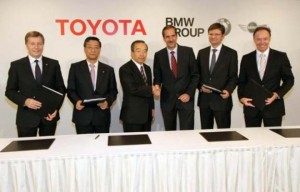Toyota and BMW have confirmed they will substantially expand the nascent partnership they first launched late last year – signing a memorandum of understanding that will cover work in four key areas including high-tech fuel cells as well as the foundational “architecture” of a future sports car.
The two makers had first agreed to a limited alliance last December – echoing steps taken by a number of their key competitors, such as Daimler AG and the Renault-Nissan Alliance. Those three brands have been rapidly expanding their own partnership in a bid to expand global economies of scale and to bring new technologies to market faster than might otherwise be possible working individually.
“It is one way of securing long-term access to customers and technologies,” said Toyota Motor Co. President Akio Toyoda, during a news conference at BMW headquarters in Munich.
For his part, Bayerische Motoren Werke CEO Norbert Reithofer emphasized that, “For the BMW Group, strategic partnerships are an essential part of our strategy.”
The original alliance the Japanese and German maker announced last year foresaw BMW supplying its partner with diesel engines. Toyota, meanwhile, revealed plans to work with its German counterpart on advanced lithium-ion battery technology.
Word of a likely expansion of the partnership had first been reported by TheDetroitBureau.com earlier this week but the degree of their new plans exceeds initial expectations. The four key areas they plan to now work on are:
- The joint development of a hydrogen fuel-cell system;
- Joint development of the architecture – or platform – as well as components for a future sports car;
- Collaboration on powertrain electrification;
- Joint R&D on lightweight materials, such as carbon fiber.
Ultra-light and extremely strong, carbon fiber is seen by many as a crucial material if manufacturers hope to meet the stringent new emissions and mileage standards enacted in the U.S., Europe and other parts of the world. Both makers have been looking for ways to cut production times and costs for producing the material. Toyota used carbon fiber extensively in the Lexus LFA supercar while BMW plans to use it in new battery-based products such as the i3 electric city car and i8 plug-in sports car.
BMW had previously been involved in a joint fuel cell research program with General Motors but announced this week it had ended that effort. Fuel cells use hydrogen gas to produce electric current – and exhaust that consists solely of water vapor – which can be used to replace a battery in an electric vehicle. The technology offers the potential advantage of being refillable, like a conventional gas engine, overcoming the range problems of battery cars.
Both BMW and Toyota are plunging aggressively into battery-based technologies. The German maker will soon launch its new “i” sub-brand while Toyota is rolling out an assortment of new hybrids, plug-ins and pure battery-electric vehicles this year. One, the RAV4-EV, was developed through an alliance with California start-up Tesla Motors.
The makers declined to discuss details of the sports car they envision. Toyota recently launched production of a sporty coupe it developed as part of another joint venture with Subaru.
Both makers have traditionally tended to go it alone, but that has been changing rapidly over the last several years. BMW’s first hybrid system, for example, was developed as part of a broad alliance with Daimler AG, GM and Chrysler.
Because of the breadth of new technology required to remain competitive – and their high cost of development, “No one can handle it all by themselves,” Yoshi Inaba, president and COO of Toyota Motor North America, told TheDetroitBureau.com earlier this year.

